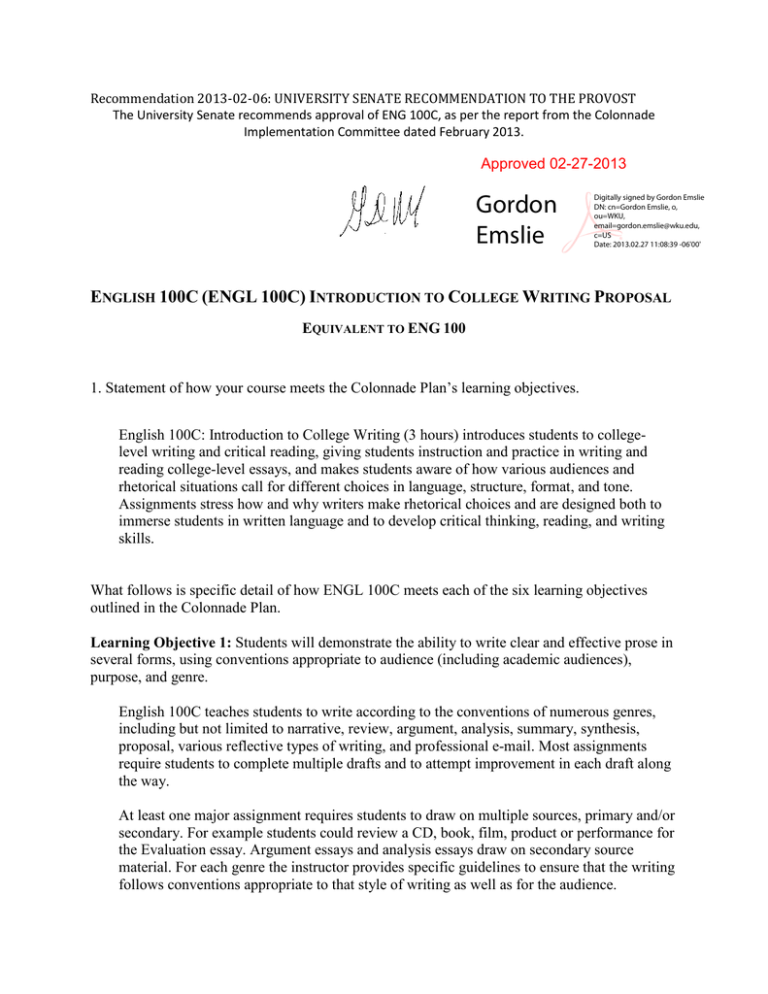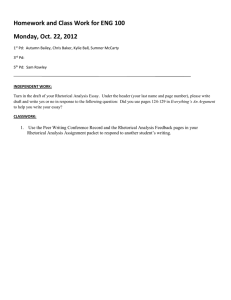Recommendation 2013-02-06: UNIVERSITY SENATE RECOMMENDATION TO THE PROVOST
advertisement

Recommendation 2013-02-06: UNIVERSITY SENATE RECOMMENDATION TO THE PROVOST The University Senate recommends approval of ENG 100C, as per the report from the Colonnade Implementation Committee dated February 2013. Approved 02-27-2013 Gordon Emslie Digitally signed by Gordon Emslie DN: cn=Gordon Emslie, o, ou=WKU, email=gordon.emslie@wku.edu, c=US Date: 2013.02.27 11:08:39 -06'00' ENGLISH 100C (ENGL 100C) INTRODUCTION TO COLLEGE WRITING PROPOSAL EQUIVALENT TO ENG 100 1. Statement of how your course meets the Colonnade Plan’s learning objectives. English 100C: Introduction to College Writing (3 hours) introduces students to collegelevel writing and critical reading, giving students instruction and practice in writing and reading college-level essays, and makes students aware of how various audiences and rhetorical situations call for different choices in language, structure, format, and tone. Assignments stress how and why writers make rhetorical choices and are designed both to immerse students in written language and to develop critical thinking, reading, and writing skills. What follows is specific detail of how ENGL 100C meets each of the six learning objectives outlined in the Colonnade Plan. Learning Objective 1: Students will demonstrate the ability to write clear and effective prose in several forms, using conventions appropriate to audience (including academic audiences), purpose, and genre. English 100C teaches students to write according to the conventions of numerous genres, including but not limited to narrative, review, argument, analysis, summary, synthesis, proposal, various reflective types of writing, and professional e-mail. Most assignments require students to complete multiple drafts and to attempt improvement in each draft along the way. At least one major assignment requires students to draw on multiple sources, primary and/or secondary. For example students could review a CD, book, film, product or performance for the Evaluation essay. Argument essays and analysis essays draw on secondary source material. For each genre the instructor provides specific guidelines to ensure that the writing follows conventions appropriate to that style of writing as well as for the audience. Finally, English 100C stresses how various audiences and rhetorical situations call for different choices in language, structure, format, and tone. As such, assignments are constructed so that students have a clear audience, purpose, and rhetorical situation. Learning Objective 2: Students will demonstrate the ability to find, analyze, evaluate, and cite pertinent primary and secondary sources, including academic databases, to prepare written texts. The purpose of English 100C is to introduce students to writing at the college level, across a variety of rhetorical situations. Each course includes at least one major assignment in which students must use secondary source material. Students must find and evaluate the usefulness of their sources and then to cite them in the appropriate format for this assignment. Some sections of English 100C require students to make use of secondary source material for multiple assignments. The Argument essay, in particular, speaks to this objective. This requires students to conduct research on a current topic that is subject to debate. To complete this assignment they must identify sources and their arguments, summarize the arguments, correctly use quotations, and correctly cite those sources. Learning Objective 3: Students will demonstrate the ability to identify, analyze, and evaluate statements, assumptions, and conclusions representing diverse points of view, and construct informed, sustained, and ethical arguments in response. While all of the assignments in English 100C meet Learning Objective 3, it is worth noting that the Literacy Narrative is a good example of how the course meets this objective. Student must evaluate their own beliefs and values, and connect them to larger cultural values and beliefs. This requires them to first conduct self-reflection, evaluate and analyze their own experiences with literacy development, and place those experiences within the context of broader cultural values, habits, and beliefs about literacy. Another common assignment in English 100C that meets this objective is the Argument essay. Students formulate a position on a debatable subject, evaluate other credible positions and evidence on the subject, and formulate an argument that allows them to enter the critical debate about that subject. Their arguments must incorporate secondary source material both to support their positions and to identify and address opposing points of view. Learning Objective 4: Students will demonstrate the ability to plan, organize, revise, practice, edit, and proofread to improve the development and clarity of ideas. English 100C helps students discover and examine their own writing processes and stresses the collaborative nature of those processes. As such, every stage of writing is open to class discussion and peer review. Instructors help students articulate their rhetorical choices as they write, and should employ peer review in discovery, drafting, and revision processes. Peer review, writing in which students reflect on their strengths and weaknesses, writer’s memos and rhetorical commentaries are all examples of briefer, less formal writing that gives students practice in thinking critically about themselves as writers who follow a writing process. Assignments often require students to submit outlines, proposals, and multiple drafts, with each draft being evaluated and final drafts being graded to determine improvement. 3. Brief description of how your department will assess this course’s effectiveness. The English department will assess the effectiveness of English 100C by incorporating the Colonnade Plan Learning Outcomes into our existing assessment structure. ENGL 100C is assessed with ENG 100 at the same time, as a joint effort under the direction Chris Ervin, Director of Composition. The department will collect samples of writing from every section of English 100C. These samples will be chosen randomly and all student information will be removed. Teams of English department faculty will assess these essays following the measures of success in general education courses as established by the department’s General Education Assessment Committee: 4 = outstanding (far exceeds expectations) 3 = good (exceeds expectations) 2 = average (meets basic expectations) 1 = poor or unacceptable (falls below basic expectations) Because of the large volume of essays that must be read, the department will select two target items from the Colonnade Plan Learning Outcomes to assess each year. In 2013, those item will be Find, analyze, evaluate, and cite pertinent primary and secondary sources, including academic databases, to prepare written texts. and Identify, analyze, and evaluate statements, assumptions, and conclusions representing diverse points of view, and construct informed, sustained, and ethical arguments in response. Our targets are as follows: 1) 80% of English 100 essays will score 2 (average—meets expectations) or higher for both measurements 2) 30% of English 100 essays will score 3 (good-exceeds expectations) or higher for both assessments. The following year, we will assess the other two learning outcomes, and in the third year we will evaluate any of the four total outcomes that we feel most need additional attention, following the results of the first two assessments. In this manner, every learning outcome will be assessed at least once in every three year period. The English department’s General Education Assessment Committee has operated for several years, and has in place the infrastructure and training to run this assessment. This plan to assess the Colonnade Plan Learning Outcomes will build on this foundation and will serve as a comprehensive approach to evaluating the effectiveness of English 100. 4. If necessary, a list of any proposed revisions needed to bring you course in line with the Colonnade Plan. This course will not require any changes that will require the department to go through the formal curricular process. Each year the department conducts a formal assessment of the effectiveness of ENG 100. From there the Director of Composition, Christopher Ervin, as well as members of the assessment committee (the entire full-time faculty of the department, in addition to volunteer part-time faculty), institute changes to the common sections of the syllabi. This is an ongoing process and the course is, in that sense, revised on a continuous basis. EXAMPLE SYLLABUS: ENGLISH 100C ENGLISH 100C– Introduction to College Writing (3 credit hours) Instructor Information [Removed from example syllabus] Course Prerequisite: Minimum score of 16 on English section of ACT or completion of DENG 055C with C or higher. Catalog Description: This course emphasizes writing for a variety of rhetorical situations with attention to voice, audience, and purpose. Provides practice in development, organization, revision, and editing. Introduces research skills. Students who have unsuccessfully attempted English 100C (earned grade of W, F, or FN) may not retake English 100 as a WEB section except under extraordinary circumstances, and then only with the written permission of the Director of Composition. General Education Goal Met by the Course: English 100C helps to fulfill the A.1. (Organization and Communication of Ideas) general education requirement at WKU. The course will help you attain these general education goals and objectives: 1. The capacity for critical and logical thinking and 2. Proficiency in reading, writing, speaking. Required Texts Bullock, Richard, and Maureen Daly Goggin. The Norton Field Guide to Writing, with Readings. 2nd edition. New York: Norton, 2010. ISBN 978-0-393-93381-9 Troyka, Lynn, and Douglas Hesse. Quick Access COMPACT. 2nd edition. Upper Saddle River: Prentice Hall, 2010. ISBN 0205687342. Important Dates [Removed from example syllabus] Course Goals: The goals of the course are to introduce students to college-level writing and critical reading, to give students instruction and practice in writing and reading college-level essays, and to make students aware of how various audiences and rhetorical situations call for different choices in language, structure, format, and tone. Students receive instruction and practice that allow them to clearly articulate their audience, purpose, and rhetorical situation for writing assignments. Reading assignments stress how and why authors make rhetorical choices and are designed both to immerse students in written language and to develop critical thinking, reading, and writing skills. Learning Outcomes Upon completion of this course, students will demonstrate the ability to: 1. Write clear and effective prose in several forms, using conventions appropriate to audience (including academic audiences), purpose, and genre. 2. Find, analyze, evaluate, and cite pertinent primary and secondary sources, including academic databases, to prepare written texts. 3. Identify, analyze, and evaluate statements, assumptions, and conclusions representing diverse points of view, and construct informed, sustained, and ethical arguments in response. 4. Plan, organize, revise, practice, edit, and proofread to improve the development and clarity of ideas. Course Grades* Final Portfolio 400 Participation 250 Essay 1: Literacy Narrative 50 Essay 2: Review 50 Essay 3: Arguing a Position 50 Essay 4: Advertising Analysis 50 Professional/Reflective E-mails50 In-class writing (including final exam) 100 Total Final Grading Scale 1000-900 = A 899-800 = B 799-700 = C 699-600 = D Below 600 = F 1000 Writing Assignment Descriptions and Lengths Essay 1, Literacy Narrative: In this essay, you will reflect on how some kind of literacy (reading, writing, language use) event has shaped some facet of your identity. Literacy narratives must make connections between the beliefs and values represented by the personal narrative or autobiography and larger cultural values and beliefs about literacy. In other words, write an essay that connects your personal literacy experiences with the state of literacy in our culture at large. Research requirements: None. Length: 900+ words. Essay 2, Review: write an evaluation of a subject based on a list of specific criteria common to all subjects that belong to a “category” (or, in the case of a text, to a specific genre). You can review a product, a place, a film (see restrictions below), a CD, an event, a performance, or another subject that I approve. Research requirements: None beyond the primary subject. Length: 900+ words. Essay 3, Arguing a Position: The purpose of this essay is to write an effective research-based argumentative essay that takes the form of an op-editorial essay or a letter to the editor. The essay’s subject must be a local, debatable, current topic. Research requirements: In arguing your position, you will learn how to correctly summarize, paraphrase, and quote various sources and to correctly document your sources in MLA format. Minimum sources to be used: 3. Length: 1200+ words. Essay 4, Textual Analysis: Identify a combination of textual artifacts (you must combine at least two kinds of artifacts—film and t.v., or magazine article and advertisement, for example) that reflect cultural values or beliefs; to analyze the way those texts reflect a particular belief or value held (or emerging) in America during the first two decades of the twenty-first century; and to communicate your analysis to your readers through example, illustration, and support from research. Research requirements: You must draw on at least two scholarly sources for this essay. Length: 1200+ words. Course Policies [Removed from example syllabus] Schedule [Removed from example syllabus]



